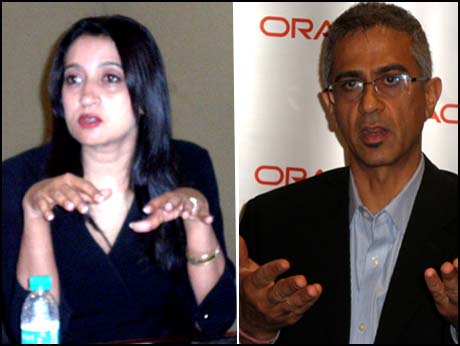
From Anand Parthasarathy, in Hyderabad.
Eighteen months after it assumed control over the fate of Java, as part of its acquisition of Sun Microsystems, enterprise solutions giant, Oracle, assured Indian software developers that it was there for the long haul with a generous kitty and a clear road map to ensure the continued leadership of the world's most ubiquitous computing environment. For its message of reassurance, it chose the first ever India edition of JavaOne , the annual gathering of Java's fiercely loyal users, an event that drew over 3000 of India's best and brightest programmers to Hyderabad this week. The event was held alongside OracleDevelop, its own annual event. 'Under new management', Java's creators were working overtime to make up for the brief hiatus since the last major update in 2006, said Nandini Ramani, Oracle's Vice President for Java Client Development, and a 16 year veteran with Java during its 'Sun'-ny years. Credited with leading the development of JavaFX, the challenger to Adobe's Flash environment for web-based animation and graphics, Ramani it would be available in a public beta version later this month; while the next iteration of the developer environment-- JDK 7 -- would be out by mid 2011.
With Oracle, we will soon be back to a regular cadence of releases, she added, allaying any latent fears of a slow down on Java-related innovation.
Param Singh, Senior Director, Java Product Development, added that with over 3 billion mobile devices running on Java, and over 45,000 Java mobile applications out there in the public domain, this was by far the dominant medium for portable -- mainly phone -- devices. Companies like TCS were harnessing Java ME to reach out to India's rural masses. Java on cards -- smart cards, ID cards and payment cards --continued to dominate this space ... and Oracle while not a 'client -centric player in its core businesses, would continue to grow the client Java side, he added.
The 2-day conference ends on May 11.
May 10,2011